LVIII
Till now, said then the knight, I weened well,
That great Cleopolis,[*] where I have
beene, 515
In which that fairest Faerie Queene doth
dwell,
The fairest citie was that might be seene;
And that bright towre all built of christall
cleene,
Panthea,[*] seemd the brightest thing
that was:
But now by proofe all otherwise I weene;
520
For this great Citie that does far surpas,
And this bright Angels towre quite dims that towre
of glas.
LIX
Most trew, then said the holy aged man;
Yet is Cleopolis, for earthly frame,[*]
The fairest peece that eye beholden can;
525
And well beseemes all knights of noble
name,
That covett in th’ immortall booke
of fame
To be eternized, that same to haunt,
And doen their service to that soveraigne
dame,
That glorie does to them for guerdon graunt:
530
For she is heavenly borne, and heaven may justly vaunt.
LX
And thou faire ymp, sprong out from English race,
How ever now accompted Elfins sonne,
Well worthy doest thy service for her
grace,
To aide a virgin desolate fordonne.
535
But when thou famous victory hast wonne,
And high emongst all knights hast hong
thy shield,
Thenceforth the suit of earthly conquest
shonne,
And wash thy hands from guilt of bloudy
field:
For blood can nought but sin, and wars but sorrowes
yield. 540
LXI
Then seek this path, that I to thee presage,
Which after all to heaven shall thee send;
Then peaceably thy painefull pilgrimage
To yonder same Hierusalem do bend,
Where is for thee ordaind a blessed end:
545
For thou emongst those Saints, whom thou
doest see,
Shall be a Saint, and thine owne nations
frend
And Patrone: thou Saint George shalt
called bee,
Saint George[*] of mery England, the signe of victoree.
LXII
Unworthy wretch (quoth he) of so great grace,[*]
550
How dare I thinke such glory to attaine?
These that have it attaind, were in like
cace,
(Quoth he) as wretched, and liv’d
in like paine.
But deeds of armes must I at last be faine
And Ladies love to leave so dearely bought?
555
What need of armes, where peace doth ay
remaine,
(Said he,) and battailes none are to be
fought?
As for loose loves, they’re vain, and vanish
into nought.
LXIII
O let me not (quoth he) then turne againe
Backe to the world, whose joyes so fruitlesse
are; 560
But let me here for aye in peace remaine,
Or streight way on that last long voyage
fare,
That nothing may my present hope empare.
That may not be, (said he) ne maist thou
yit
Forgo that royall maides bequeathed care,[*]
565
Who did her cause into thy hand commit,
Till from her cursed foe thou have her freely quit.




